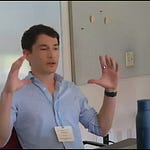Watch our dialogue below:
Here an edited ChatGPT summary of the transcript:
Discussion on Computation and Ontology:
The conversation begins focused on the book Contingent Computation by M. Beatrice Fazi, which Matt had not encountered before but is now deeply interested in, particularly due to its engagement with Deleuze and Whitehead. He appreciates how Fazi reads Whitehead as "post-Deleuzian" and contrasts their views on discreteness, logic, and potentiality.
Matt explains Fazi's position that Whitehead offers a way to treat logic and computation as irreducible to sensibility or bodily affect, distinguishing conceptual prehensions from physical ones. He notes Fazi's emphasis on the irreducibility of logical and quantitative aspects of computation, which she believes Whitehead's philosophy can accommodate.
Tim expresses some skepticism, noting that Fazi's reading of both Deleuze and Whitehead might be overly simplistic. He references how Deleuze’s political critique of computation, while grounded in concerns about control and identity, might still allow for a more nuanced understanding of the ontology of computation. Tim also brings in the concept of computational irreducibility, as explored by Stephen Wolfram, and suggests that Fazi could have engaged with this concept to bolster her argument.
Matt and Tim explore the idea that both Deleuze and Whitehead might be more balanced in their philosophical approaches than Fazi suggests. They delve into Whitehead's concept of God, which Fazi omits, arguing that Whitehead's God plays a crucial role in maintaining the coherence of his philosophical system, particularly in balancing the conceptual and physical aspects of reality.
Philosophical Tensions and Syntheses:
The conversation weaves through various philosophical tensions, such as the relationship between the eternal, the virtual, and the actual, the role of abstraction, and the balance between identity and difference.
Matt highlights Whitehead's view that abstraction is a constructive process, integrating past actuality and ideality into experience, which contrasts with Deleuze’s more critical stance on abstraction as a burden on experience. Tim argues that Deleuze, too, recognizes the constructive role of abstraction, though in a different way, emphasizing the need for novel differentiation.
Conclusion and Future Directions:
The conversation concludes with a discussion on the importance of taking an ontologically realist and media ecological perspective on computation. Both Matt and Tim see the value in exploring how our direct experiential engagement with emerging technologies shapes the ways we then come to understand those very technologies. They plan to continue their exploration of these ideas, with a return to Peirce’s work in their next discussion.











